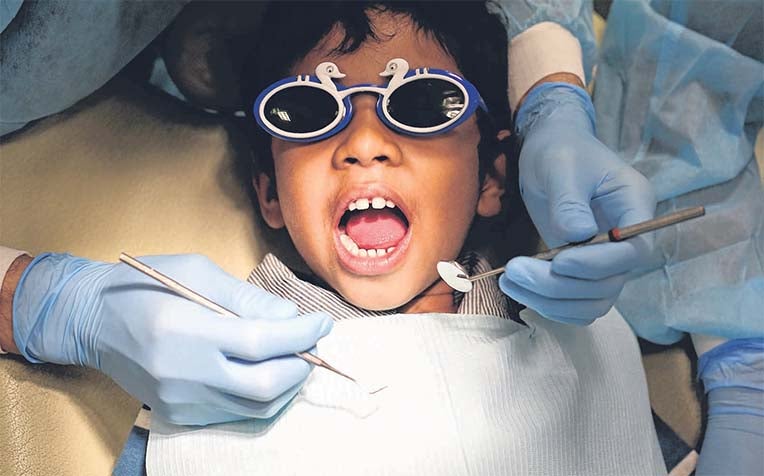
highlight worrying figures of tooth decay among pre-schoolers here, despite efforts to raise awareness.
When her six-year-old son began complaining of a toothache, Ms Huang took him to the dentist – only to learn that at least seven of his teeth had severe decay.
Dentists said that the boy – then in Kindergarten 2 – needed surgery for root canal treatment and tooth extraction.
Ms Huang and her husband baulked at the idea. Surgery was expensive, would involve general anaesthesia, and her son had also stopped complaining of the pain.
“We pulled out thinking that he would outgrow (the problem), because adult teeth would push out the baby teeth,” said the 38-year-old, who declined to reveal her full name or occupation. But the ache returned, leaving them with no choice but to do as the dentists recommended.
Ms Huang’s niece, too, had similar dental woes and had to extract her upper set of front teeth at just three years old.
Such problems are not uncommon among children here, said paediatric dentists.
They said parents often assume that baby teeth are not permanent and so do not require as much care.
In fact, at least half of Singapore’s pre-schoolers – children aged six and below – have tooth decay, said paediatric dentist Badrun Nafis from Thomson Paediatric Centre (Katong).
Worse, 38.4 per cent of the pre-school population have severe early childhood decay, he said.
“There is a large number of children in the population who require dental treatment,” he said.
Despite efforts to raise awareness of the issue among parents, polyclinic doctors and pre-school teachers, the rate of childhood tooth decay remains “relatively stable”, said Dr Tan Wee Kiat from the National Dental Centre Singapore (NDCS).
Compared with children from around the world, the dental health of those here stands somewhere in between.
Studies have found that in countries like Laos and the Philippines, nine out of 10 children aged five and six have tooth decay. A Swedish study found that among children aged between three and six, only 11.6 per cent had tooth decay.
The problem here is often traced to the regular intake of formula milk – as was the case with Ms Huang’s son – or the high consumption of sugary snacks, said paediatric dentist Terry Teo, who heads Q&M Kids and sees one case of serious tooth decay nearly every day. While brushing helps, many children do not do so properly, he added.
Latest available figures from the NDCS – the largest specialist dental centre in Singapore – showed that it saw 1,000 children in 2012. Currently, around 90 per cent of children who come in have severe tooth decay, said Dr Tan.
Many of these children require general anaesthesia when their teeth are being fixed, she said.
Half of those who require general anaesthesia have at least 10 decayed teeth – or half their teeth, she added.
Even though baby teeth do fall out eventually, experts said problems with these teeth can affect the development of adult teeth. These include defects of the enamel, which make adult teeth more susceptible to cavities.
“Parents need to bring their children in early to see a dentist to be able to detect early tooth decay, as well as get the necessary preventive advice and care for their children’s teeth,” said Dr Rashid Tahir, a specialist paediatric dentist with The Kids Dentist.
Dentists say parents should take their children to a dentist by the age of one and use the right fluoridated toothpaste. Children should also not be allowed to fall asleep with a bottle containing sweet liquids such as formula milk and juice. Breast milk and fresh milk have weak sugars and do not often cause cavities.
This is what Ms Huang now does. She has stopped giving formula milk to her son entirely and he also brushes his teeth twice a day.
“We didn’t have the habit prior to the dental visit,” she said. “It was a wake-up call.”
Contributed by














 Get it on Google Play
Get it on Google Play